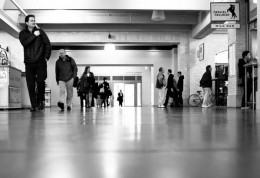Commuting to Work and Not Feeling Miserable About It

Nicole Engelbert, 41, could save time most days by driving from Bronxville to her job in Manhattan as a research-team leader at Ovum, a technology-research company. But she opts for a one-hour commute by train and subway instead.
She walks to and from the station every day, taking her 2-year-old son to preschool in the morning and doing errands in the evening. She avoids chatting with other passengers, using the ride as “an in-between space” to read or think. Sketching on a note pad during a recent ride, she came up with a new idea for analyzing technology markets. “Driving could take half as much time, but I could be cursing at the driver in front of me and not getting a chance to read my book or relax,” she says.
The common denominator in this WSJ story about what makes commuting to and from work enjoyable (despite the time it takes) for people is having things to do to make the trip feel more efficient. A six-year study of nearly 30,000 British rail passengers found that 37 percent fewer passengers felt like their time was being wasted during their commute in 2010 compared with 2004, and researchers hypothesize that mobile devices that have allowed them to do things like check email, or listen to podcasts or music have helped commuters feel like they’re being more productive.
When I owned a car and sat in traffic in Los Angeles, I despised commuting to work every day (despite being able to listen to KCRW). Being able to take public transportation and having a device that allows me to check my email, read the newspaper and listen to recorded interviews have made my commute so much more enjoyable.
Photo: Kenny Louie
Support The Billfold
The Billfold continues to exist thanks to support from our readers. Help us continue to do our work by making a monthly pledge on Patreon or a one-time-only contribution through PayPal.
Comments